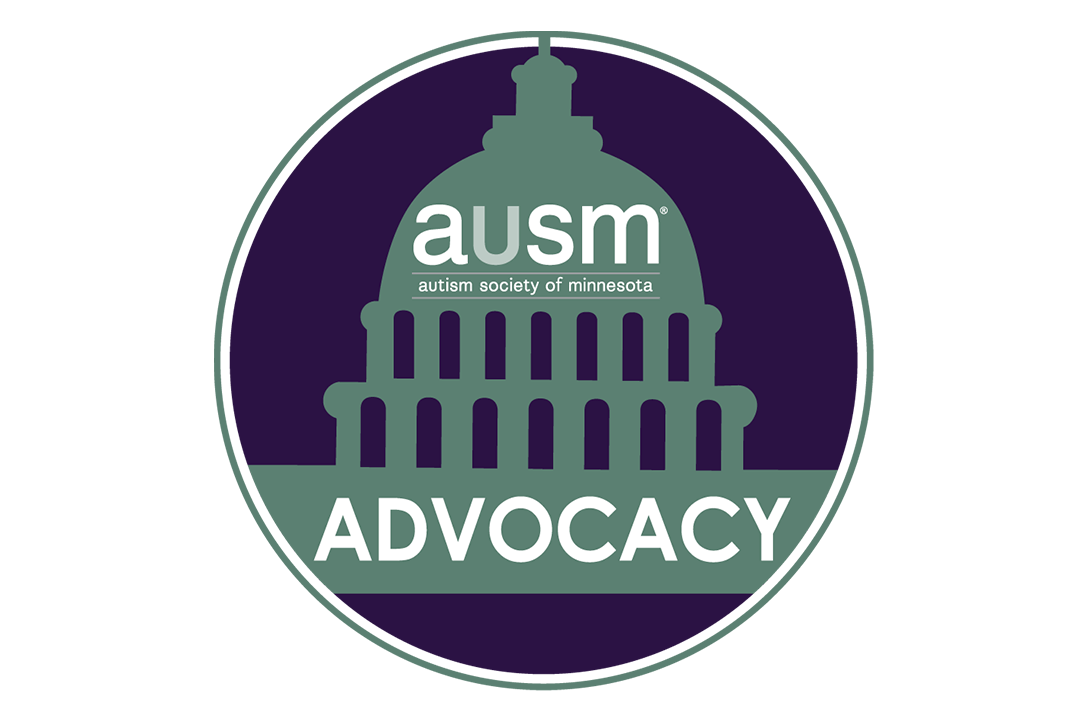Advocacy Update: Feb. 15, 2021

During the 2021 legislative session, AuSM is spearheading a package of bills aimed at increasing accessibility for those with invisible disabilities. Throughout the session, we’ll share advocacy updates in our e-newsletter and on our website to keep our community informed.
Bills
2021 session has been moving slowly due to the constraints of COVID-19. Despite the challenges, AuSM has introduced two bills to the House:
Sensory-Friendly Grant: House File 139
Appropriation Reintroduction of our 2020 legislation for a grant appropriation for sensory-friendly projects in public access spaces.
Emergency Shelter Accessibility: House File 193
Legislation to create guidelines for equitable access to homeless and domestic violence shelters for individuals with neurological and intellectual disabilities.
The next step in the process for both of these bills is committee discussion.
In addition to the two introduced bills, AuSM is waiting on finalized language for two of our bills:
Sensory-Friendly Event Licensing
A bill amending permit requirements for large event approval to include requirements to provide sensory-friendly space or accommodations for any public event that includes more than 1,000 participants.
Special Education Parent Accessibility
A bill outlying requirements for educators to accommodate parents with disabilities in the IEP process to allow better access to special education for families with multiple generations of disability
Typically, revisers are available to work with policy advocates and legislators to finalize the language of a bill before it’s introduced. Due to pandemic regulations, minimal revisers can work together at a time, which has drastically slowed down the process.
AuSM’s Advocacy Committee also has been involved in testifying on a number of other bills, including a bill that would secure micro grants for self-advocates working on community inclusion projects (Senate File 188). In the upcoming week, we will testify for a sexual education bill that includes language on disability (House File 359).
Events
On Tuesday, Feb. 16, AuSM is partnering with the MN Consortium for Citizens with Disabilities (MNCCD) to host a virtual Tuesday at the Capitol from 10-11 a.m. focused on Black disability in honor of Black History Month. You can join via Zoom through the MNCCD website.
On Feb. 23, a number of disability organizations will join together for Disability Advocacy Day “Off the Hill.” This year’s event will be virtual, and Jillian Nelson, AuSM’s Community Resource and Policy Advocate, will speak. We invite all community members to participate and learn about current policy issues and meet with legislators. Register online at the MNCCD website.
Other Initiatives
The Autism of Society of Minnesota endorses a statement recently released by Gillette Specialty Healthcare regarding the prioritization of individuals with disabilities and complex care needs for earlier and prioritized access to Covid-19 vaccination. Read the complete Gillette statement.
The Centers for Disease Control documents that many individuals with autism as well as many peers in the broader disability community embody the conditions and circumstances noted in the statement that make their risk of COVID-19 infection, complication, or subsequent death disproportionately higher than the typical community.
Furthermore, the disability community is host to many individuals and families of color, as well as many living in poverty or poverty-adjacent conditions. It is well-established that these groups have carried the disparate burden of health and economic consequence since the onset of this pandemic. People with disabilities, their families, and their care providers are valued members of our society, and we have a responsibility and opportunity to demonstrate that with equity-focused vaccination policy.
For those with disabilities, we and other advocates assert that widespread vaccination could “lead to an end to remote learning, resumption of regular therapy, support and respite care services, improved employment opportunities and it may allow individuals living in group homes and other congregate settings to see their families and friends again,” as noted in this article published on Disability Scoop.
NOTE: This endorsement is regarding access to vaccination. AuSM is not a medical provider and does not offer medical advice. AuSM recommends that people follow guidance from qualified medical professionals for individualized and personal healthcare decisions.